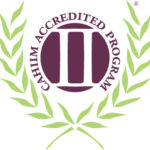Health Information Technology - HIT
Overview
About the program
Quality information is essential to all aspects of today's healthcare system. Health Information Management (HIM) is the body of knowledge and practice that ensures the availability of health information to facilitate real-time healthcare delivery and critical health-related decision making for multiple purposes across diverse organizations, settings, and disciplines. HIM professionals play a critical role in maintaining, collecting and analyzing the data that doctors, nurses and other healthcare providers rely on to deliver quality healthcare. They are experts in managing patient health information and medical records, administering computer information systems and coding the diagnosis and procedures for healthcare services provided to patients and more. Health information management (HIM) professionals work in 40 different settings under 125 different job titles. They often serve in bridge roles, connecting clinical, operational, and administrative functions.
What is HIM?
Program format(s)
Both the degree and certificate programs are completed online.
Degree Option
Health information technicians fill a wide variety of roles in health information management, quality management, information systems, revenue cycle, and more within the healthcare industry. HI techs are responsible for ensuring healthcare data is complete, accurate, timely, and available to internal and external users.
Two-year (5 semesters) full-time degree schedule with a mix of core health information management, general education, and allied health courses. The program requires professional practice experience, which provides professional development in the modern workplace, either in-person or virtually. This program is fully online and can be completed on a part-time basis.
Timely, accurate, and complete information is essential to all aspects of today's healthcare system. Health Information Management (HIM) is the body of knowledge and practice that ensures the availability of health information to facilitate real-time healthcare delivery and critical health-related decision making for multiple purposes across diverse organizations, settings, and disciplines. HIM professionals play a critical role in maintaining, collecting, and analyzing the data that doctors, nurses, and other healthcare providers rely on to deliver quality healthcare. They are experts in managing patient health information and medical records, coding the diagnoses and procedures for healthcare services provided to patients, and protecting the privacy and security of protected health information. Health information management (HIM) professionals work in many different settings with a wide range of job titles.
Accreditation
 The Health Information Management accreditor of Marion Technical College is the Commission
on Accreditation for Health Informatics and Information Management Education (CAHIIM).
The College’s accreditation for the associate degree in health information management
has been reaffirmed through 2032-2033. All inquiries about the program’s accreditation
status should be directed by mail to CAHIIM, 200 East Randolph Street, Suite 5100,
Chicago, IL, 60601; by phone at (312) 235-3255; or by email at info@cahiim.org.
The Health Information Management accreditor of Marion Technical College is the Commission
on Accreditation for Health Informatics and Information Management Education (CAHIIM).
The College’s accreditation for the associate degree in health information management
has been reaffirmed through 2032-2033. All inquiries about the program’s accreditation
status should be directed by mail to CAHIIM, 200 East Randolph Street, Suite 5100,
Chicago, IL, 60601; by phone at (312) 235-3255; or by email at info@cahiim.org.
Certification
Marion Technical College’s (MTC) Health Information Technology program is designed to prepare students for the ever-changing and constantly growing field of Health Information Management. Within the program, students will cover a wide range of topics, including health information management, medical terminology, electronic health records, computer applications, coding, healthcare statistics, healthcare reimbursement, continuous quality improvement, resource management, and legal issues. In the final semester of this program, students will prepare and register for national certification testing. Upon successful completion of the American Health Information Management Association (AHIMA) external certification examination, the graduate is awarded the credential of a registered health information technician (RHIT). AHIMA, 223 N. Michigan Ave, 21st floor, Chicago, IL 60602-5800, 312-233-1100.
Occupational Certification Opportunities
- Industry Certification: CCA (Certified Coding Assistant), CCS-P, CCA, CPC
- National Health Career Association (NHA): Certified Billing & Coding Specialist (CBCS)
Health Information Technology Student Success
|
Graduation Academic Year |
2020 |
2021 |
2022 |
2023 |
2024 |
|
Number of Graduates |
11 |
6 |
6 |
6 |
5 |
|
Graduates Working for an Ohio Employer |
11 |
5 |
3 |
5 |
4 |
|
AHIMA Certification Exam Results – MTC Student Pass Rate (1st attempt) |
75% |
100% |
100% |
100% |
80% |
|
AHIMA Certification Exam Results – National Pass Rate (1st attempt) |
67% |
70% |
68% |
80% |
80% |
Learning Outcomes
- Review health records and verify completeness, accuracy, and appropriateness of data and data sources according to requirements and standards.
- Code, classify, and index diagnoses and procedures for the purpose of reimbursement, standardization, retrieval, and statistical analysis.
- Apply the reimbursement policies and procedures in the use of clinical data, issues, and systems, and perform data quality reviews to validate code assignments as well as the completion of the UB-04 and CMS-1500.
- Collect, compute, analyze, interpret, and present statistical data related to healthcare services, including quality management, utilization management, risk management, medical research, disease registries, and clinical indices.
- Apply legal principles, policies, regulations, and standards for the control, use, and dissemination of healthcare information.
- Use software applications and technology in the completion of Health Information Management processes.
- Apply principles of supervision and leadership and the tools used to effectively manage human, financial, and physical resources.
- Recognize and problem solve situations within the healthcare environment.
- Participate in the planning, design, selection, implementation, integration, testing, evaluation, and support for EHRs.
- Use appropriate electronic or imaging technology for data/record storage.
- Query and generate reports to facilitate information retrieval using appropriate software.
Career Opportunities
- Health Information Technicians
- Medical Billers
- Medical Coders
- Data Abstractors
- Claims Processing Technicians
- Accounts Receivable/Follow-Up Representatives
- Data Analysts
- Cancer Registrars
- Trauma Registrars
Application Requirements - Limited Enrollment
- Completed MTC Application for Admission.
- Final high school transcript (or GED results) and college transcripts (if applicable).
- A minimum 2.5 accumulative grade point average (GPA) in high school or college-level courses (whichever is most recent).
- Completed Health Information Technology application (link to apply provided by first-year advising).
If required, College Foundation courses are available to help you meet any specialized program admission requirements. A complete listing of all requirements and policies/procedures for the program is available in the Health Information Technology Handbook.







